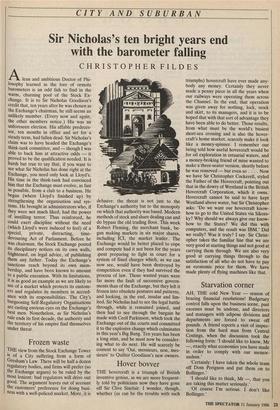Hover bovver
THE hovercraft is a triumph of British inventive genius, as we are more frequent- ly told by politicians now they have gone off Sir Clive Sinclair. I wonder, though, whether (as can be the trouble with such triumphs) hovercraft have ever made any- body any money. Certainly they never made a penny piece in all the years when our railways were operating them across the Channel. In the end, that operation was given away for nothing, lock, stock and skirt, to its managers, and it is to be hoped that with that sort of advantage they have been able to do better. Those results, from what must be the world's busiest short-sea crossing and is also the hover- craft's home market, scarcely make it look like a money-spinner. I remember our being told how useful hovercraft would be for oil exploration in estuarial waters, and a money-broking friend of mine wanted to make a three-seater version, shortly before he was removed — but even so . . . . Now we have Sir Christopher Cockerell, styled the Father of the Hovercraft, pointing out that in the dowry of Westland is the British Hovercraft Corporation, which it owns. Hovercraft cannot be said to have kept Westland above water, but Sir Christopher asks: `Do we want our hovercraft know- how to go to the United States via Sikors- ky? Why should we always give our know- how to the States? We did this with computers, and the result was IBM.' Did we really? Was it truly? I say. Sir Christ- opher takes the familiar line that we are very good at starting things and not good at carrying them through. We are also very good at carrying things through to the 'satisfaction of all who do not have to pay an economic price for them. We have made plenty of flying machines like that.


























































 Previous page
Previous page